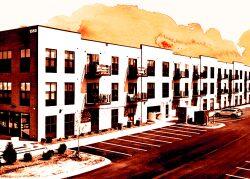Naperville still has no plans to increase its lack of affordable housing but has greenlit a project for more luxury apartments and row houses.
The City Council approved a 212-unit apartment complex for the city’s far south side and a development of eight row houses near Rotary Hill, the Naperville Sun reported.
San Francisco-based Bridge Capital Partners is the developer behind the Belvedere luxury apartment proposal.
The complex will rise at 24254 111th Street, the 20-acre former home of Lizzie’s Garden nursery. The land, which is located in unincorporated Will County, has been zoned for agricultural use only. The project’s approval, however, means the land, which is just west of the Naperville Marketplace shopping center on Route 59, can be annexed into the city and, therefore, rezoned for multi-family residential use.
The developer plans to include several amenities in the luxury complex, including a clubhouse, pool, playground and dog park. Rents will range from $1,950 for a one-bedroom apartment to $3,050 for a three-bedroom.
In the past, traffic concerns were expressed at planning and zoning commission meetings, but none were raised prior to the council’s vote.
The City Council also approved plans for Charleston Building and Development to build two, three-story buildings with eight French city-style row houses on Aurora Avenue.
The project will replace the former veterinary clinic at 445 Aurora Avenue, between Rotary Hill and the RiverPlace Condominium complex. One of the buildings will have five units and the other will hold three. The developer also agreed to include a pedestrian walking path that will run adjacent to the homes and connect to the Naperville Riverwalk system.
Last month, Naperville, which has drawn criticism for having too little affordable housing, rejected an incentive program for more of these developments. The planning and zoning commission voted against a voluntary program that included density bonuses and relaxed requirements for yards, setbacks, floor area ratios and parking because the public wouldn’t be able to offer their opinions on every project.
Read more


— Victoria Pruitt
